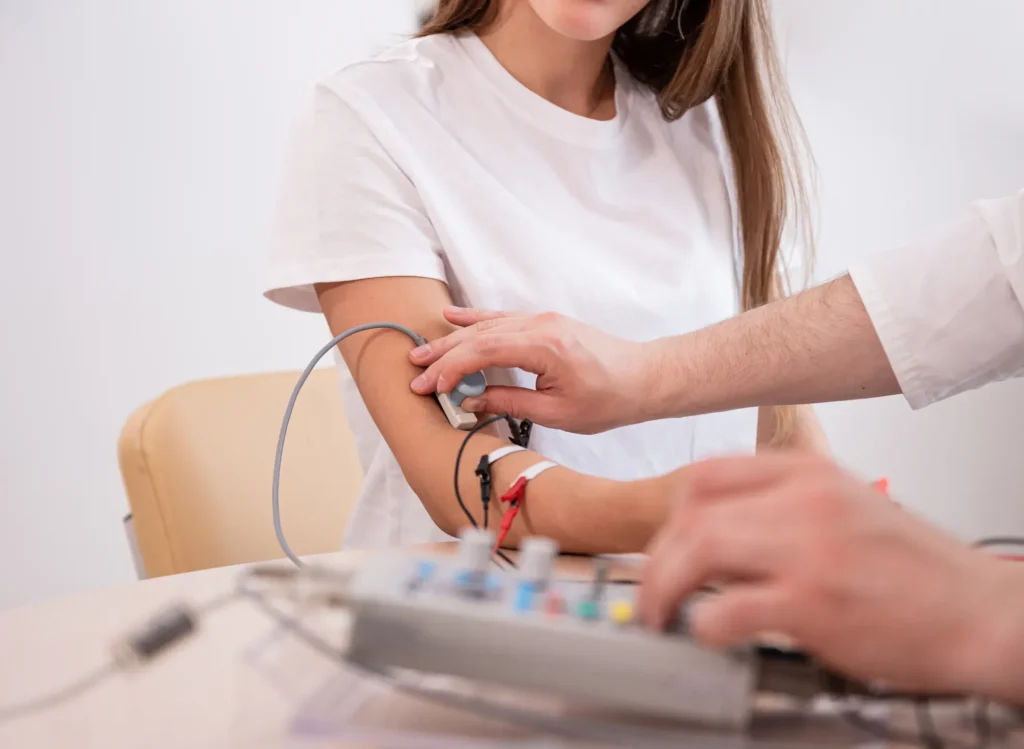Electromyography (EMG) and Nerve Conduction Velocity (NCV) are advanced diagnostic tools used to assess the health and function of muscles and nerves. These tests provide crucial insights into neuromuscular disorders, nerve damage, and muscle conditions, helping doctors make accurate diagnoses and develop effective treatment plans.
What does an EMG do?
EMG measures the electrical activity of muscles. It detects the tiny electrical signals generated by muscle fibers during contraction and at rest, providing valuable information about muscle function and potential neuromuscular disorders.
What does NCV do?
NCV measures the speed and strength of electrical signals as they travel along nerves. This test helps identify areas of nerve damage or dysfunction by comparing conduction velocities in different nerve segments.

EMG (Electromyography):
• Small electrodes are placed on the skin or a fine needle is inserted into the muscle
• These electrodes record electrical signals from muscle fibers during contraction and rest
• Results are displayed as waveforms on a monitor for physician analysis
• While needle insertion may cause brief discomfort, the test is generally well-tolerated
NCV (Nerve Conduction Velocity):
• Surface electrodes are placed on the skin over the nerve being tested
• A mild electrical impulse stimulates the nerve at various points
• The time it takes for the impulse to travel between electrodes is measured
• Typically painless, though patients may feel a slight tingling or warmth during the test
Doctors may recommend EMG and NCV tests if you experience:
• Unexplained muscle weakness or atrophy (shrinking)
• Numbness, tingling, or “pins and needles” sensations
• Persistent pain or cramping in muscles or joints
• Involuntary muscle twitching or spasms
• Difficulty moving specific body parts (e.g., in conditions like Carpal Tunnel Syndrome)
Conditions Commonly Diagnosed:
• Peripheral neuropathy (damage to nerves outside the brain and spinal cord)
• Radiculopathy (nerve root compression, often in the spine)
• Motor neuron diseases (e.g., ALS – Lou Gehrig’s disease)
• Myasthenia Gravis (autoimmune neuromuscular disorder)
• Muscular dystrophies (genetic disorders causing progressive muscle weakness)
Accurate Diagnosis: These tests provide precise data on muscle and nerve function, allowing doctors to pinpoint the exact location and severity of nerve or muscle damage.
Guiding Treatment Plans: The detailed information gathered helps doctors make informed decisions about treatment options, whether they involve physical therapy, medications, or surgical interventions.
• Avoid applying lotions or oils to your skin before the test
• Inform your doctor of any medications you’re taking, especially blood thinners
• Wear comfortable clothing that allows easy access to the areas being tested
• Try to relax during the procedure for the most accurate results
• You may be asked to contract specific muscles during EMG testing
EMG and NCV tests are invaluable tools in neuromuscular diagnostics, offering non-invasive or minimally invasive ways to assess nerve and muscle health. By providing detailed information about how your nerves and muscles are functioning, these tests enable your healthcare team to develop a tailored treatment plan addressing your specific needs and concerns.